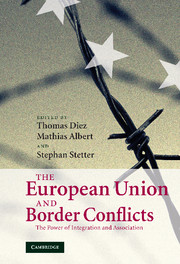Book contents
- Frontmatter
- Contents
- List of tables
- Notes on contributors
- Acknowledgements
- List of abbreviations
- Introduction
- 1 The transformative power of integration: conceptualising border conflicts
- 2 The influence of the EU towards conflict transformation on the island of Ireland
- 3 Catalysis, catachresis: the EU's impact on the Cyprus conflict
- 4 Transforming the Greek–Turkish conflicts: the EU and ‘what we make of it’!
- 5 Border issues in Europe's North
- 6 The EU and the Israel–Palestine conflict
- 7 The EU as a ‘force for good’ in border conflict cases?
- Conclusion
- References
- Index
7 - The EU as a ‘force for good’ in border conflict cases?
Published online by Cambridge University Press: 22 September 2009
- Frontmatter
- Contents
- List of tables
- Notes on contributors
- Acknowledgements
- List of abbreviations
- Introduction
- 1 The transformative power of integration: conceptualising border conflicts
- 2 The influence of the EU towards conflict transformation on the island of Ireland
- 3 Catalysis, catachresis: the EU's impact on the Cyprus conflict
- 4 Transforming the Greek–Turkish conflicts: the EU and ‘what we make of it’!
- 5 Border issues in Europe's North
- 6 The EU and the Israel–Palestine conflict
- 7 The EU as a ‘force for good’ in border conflict cases?
- Conclusion
- References
- Index
Summary
Introduction
This chapter takes a look at how EU actors conceptualise their role and that of the EU in border conflict transformation. It does this as a mirror image of the five case studies presented in this volume so as to add a more critical and reflective account of the formulation and impetus of EU policy. The chapter's core argument is that what drives EU actors is their self-representation of the EU as a ‘force for good’ and that they see themselves as ‘forces for good’ in the transformation of border conflicts. It cautions that these representations of the EU as a ‘force for good’ very effectively mask the power inherent in EU involvement in conflicts. The pathways of EU involvement developed by Albert, Diez and Stetter (this volume) are taken as the essential ways in which this EU power operates. In developing my argument about the construction of the EU as a ‘force for good’ I take as my empirical basis the self-positioning of EU policymakers – interviewed in two rounds of interviews carried out in Brussels in January 2004 and February 2005 – vis-à-vis the five conflict cases covered in this edited collection, as well as a thorough analysis of EU documentation regarding the five border conflicts. I argue that EU actors are part of and their practices replicate an epistemic community. Policy-makers working in Brussels accept an optimistic version of the narrative of the EU as a ‘force for good’, which they continuously validate, produce and reproduce.
Information
- Type
- Chapter
- Information
- The European Union and Border ConflictsThe Power of Integration and Association, pp. 203 - 219Publisher: Cambridge University PressPrint publication year: 2008
Accessibility standard: Unknown
Why this information is here
This section outlines the accessibility features of this content - including support for screen readers, full keyboard navigation and high-contrast display options. This may not be relevant for you.Accessibility Information
- 8
- Cited by
